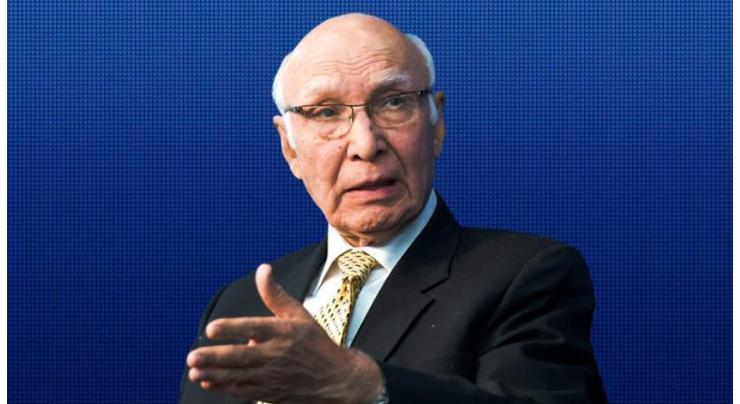
Sartaj Stresses Upon A Comprehensive Strategy For Secure
Sumaira FH Published February 11, 2017 | 08:50 PM

ISLAMABAD, (UrduPoint / Pakistan Point News - 11th Feb, 2017 ) : Advisor to the Prime Minister on Foreign Affairs Sartaj Aziz Saturday stressed that all the stakeholders and countries needed a comprehensive strategy for a secure, peaceful and prosperous Indian Ocean Region.
The advisor said such an approach should be integrated, inter-sectoral and multi-disciplinary, and aimed at promoting a maritime economy that was innovative, competitive and environment-friendly.
He was speaking at the International Maritime conference "Strategic Outlook in Indian Ocean Region 2030 and beyond- Evolving challenges and strategies" held in Karachi, said a press release of the Foreign Office.
Sartaj said Pakistan has already been playing an important role in maritime security of the area. He said the issues surrounding the protection and use of the ocean were trans-boundary in nature and required stronger cooperation among stakeholders.
He said as the Indian Ocean region had been growing in significance due to its strategic, economic and political dynamics, the changing power balance and relentless pursuit of national interest has prompted analysts to suggest that many global struggles would play out here in the 21st century.
As the Indian Ocean Region contained several conflict zones, he said, the region's maritime security challenges had grown and were affected by key variables such as militarisation, the involvement of major and extra-regional powers, and non-traditional security threats.
The Indian Ocean faced many non-traditional security challenges and threats including piracy, illegal fishing, human trafficking, drug smuggling, trafficking of weapons, maritime pollution and climate change, he added.
The Advisor said Pakistan has a strategic stake in peaceful navigation and security of Indian Ocean region as its interests emanated from its coastline that was over 1000 kilometers long, an Exclusive Economic Zone (EEZ) of around 300,000 square kilometers, the Karachi port and the newly built deep sea port of Gwadar.
"The un-demarcated borders in Sir Creek have the potential to cast a shadow on maritime security. With 95% of Pakistan's trade taking place through sea, we are heavily dependent on a tension-free Indian Ocean.
Pakistan also has a reservoir of marine economic resources in its Exclusive Economic Zone (EEZ)," he added. Sartaj said India's evolving expansionist maritime security strategy was a cause for concern for peace in Indian Ocean.
Nuclearization of the Indian Ocean has also led to further instability in the region. He said Pakistan was the third largest Indian Ocean littoral country and as a matter of policy it continued to pursue the goals of realizing the economic potential of the region.
"At the same time, we are aware of our national interests and every effort would be made to strengthen our capacity to ensure that we remain ready to meet the emerging maritime security challenges," he maintained.
"These developments have a direct impact on our security and prosperity. We have to maintain significant naval presence to keep our sea lanes open and defend our interests whether on land or on the sea," he added.
"We are part of the Coalition Maritime Campaign Plan and Pakistan was the first country to join Task Force-150 aimed at eradicating terrorism and human, arms and drug trafficking alongside other nations," he added.
He assured that Pakistan was ready and willing to expand its contribution for ensuring a peaceful Indian Ocean Region. Sartaj further said the Indian Ocean could become a powerful unifying force and a common bond that has the potential to enhance prosperity and sustainable development in the region.
The advisor said cooperation between public and private stakeholders in meeting the challenges of maritime security was also critical.
Related Topics
Recent Stories

Currency Rate In Pakistan - Dollar, Euro, Pound, Riyal Rates On 27 April 2024

Today Gold Rate in Pakistan 27 April 2024

HEC reviews curricula for environmental sciences degree programme

ICC Asia looking forward to an action-packed Asia Cricket Week

Yuvraj Singh named ICC Men’s T20 World Cup 2024 Ambassador

Greece hands Olympic flame to 2024 Paris Games hosts

Two Kyiv hospitals evacuating over feared Russian strikes

World must act on neurotech revolution, say experts

Charles & Catherine's cancer diagnoses

Champions Alcaraz and Sabalenka through in Madrid Open

King Charles to resume some public duties during cancer treatment: palace

US defense chief announces $6 bn in security aid for Ukraine
More Stories From Pakistan
-
13 criminals held
10 minutes ago -
Saudi ministry warns against fraudulent Hajj schemes; urges vigilance, official channels for booking
9 hours ago -
SC to take up 9 identical petitions regarding judges' letter
9 hours ago -
Woman committed suicide in Pindigheb
9 hours ago -
Teenage girl abducted in Hassanabdal
9 hours ago -
NTDC Super 8 Inter-Departmental Tape Ball Cricket Tournament concludes: GM (HR) team clinches the w ..
10 hours ago
-
AJK President calls for overseas Kashmiris' proactive role to expose the Modi government's nefarious ..
10 hours ago -
AJK-wide campaign begins to vanish black-tinted glasses to all sorts of vehicles
10 hours ago -
Islamabad to be digitalized as pilot project under national digitalization plan: IT Minister
10 hours ago -

HEC reviews curricula for environmental sciences degree programme
10 hours ago -

Heavy rains cause damage to Spezand-Taftan railway track
10 hours ago -

Documentary on life of Jamiluddin Aali screened at embassy
10 hours ago


